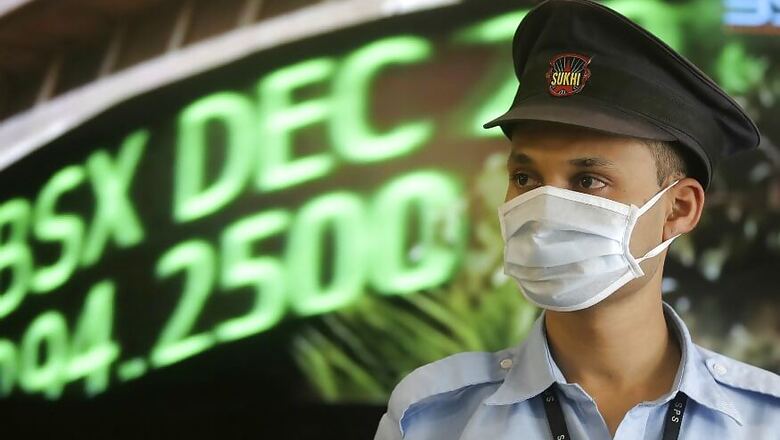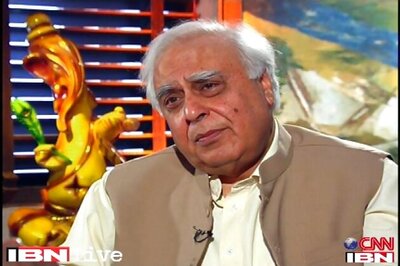
views
The novel coronavirus pandemic is wrecking the global economy. Chief economist at Fitch Ratings, Brian Coulton, said on Friday that the level of world GDP was falling and “for all intents and purposes we are in global recession territory". India is not immune to the recession sweeping across the globe. It is in fact more vulnerable since the Indian economy was already in the throes of a deep-seated slowdown for several quarters till the beginning of the year, when the COVID-19 outbreak became known.
Now, as the disruption from the virus progresses globally as well as within India, we should forget all talk of economic recovery and instead bring all hands on deck for a fast policy response to tackle the outcome of COVID-19.
Before the pandemic had set in, optimistic economists had been pointing towards a recovery spread over 18-24 months from decadal low rates of growth. But now, swathes of industries, small and medium enterprises and almost every sector of the economy stares at myriad challenges and all eyes are on the government for a substantial stimulus and recovery package.
Several countries around the world are already pumping in billions of dollars into their respective economies to prevent them from collapsing. The United States is discussing a rescue package totalling a trillion dollars, after the Federal Reserve has already eased lending rates.
Global ratings agency Fitch notes that the European Central Bank has introduced a comprehensive package focused on new liquidity and a huge increase in asset purchases for European nations. And to help businesses cope with the crisis, the Bank of Japan (BoJ) has set up a new one-year facility with a 0% interest rate.
The United Kingdom has announced large-scale macro policy easing in response including emergency rate cuts of 50 basis points (0.5%) a new term lending facility targeted at small and medium-sized enterprises (SMEs) besides a 32 billion pound COVID-19 fiscal package. Credit guarantees of 330 billion pounds have also been additionally approved.
In his address on Thursday evening, Prime Minister Narendra Modi spoke of setting up an economic task force to devise policy measures to tackle the economic challenges arising from COVID-19. While this assurance from the PM is welcome, wouldn’t some concrete plans to support the economy have worked better?
Analysts at brokerage Edelweiss note that India’s (economic) response is lagging global peers and that they anticipate no recovery in GDP growth.
“We have cut forecast to 5% in FY21 from 5.5% earlier," they said. These analysts have noted that India has delayed rate cuts and already hiked oil taxes (excise duty on petrol and diesel was increased recently as global crude prices crashed) when it needs to instead come out with policies to address the financial and economic dislocations that are likely amid lockdowns.
Take the aviation sector. With global travel restrictions kicking in and demand collapsing, India’s airlines are biding time before a partial or total shutdown of operations. This scenario is ruinous for airline balance sheets and consequently for thousands of people employed by the sector.
IndiGo and Air India are already in the process of implanting pay cuts and work-without-pay schemes as vendors, suppliers and other associates also bear the brunt. Ditto for the entire tourism industry.
While the government has begun talking of a rescue package – some reports have suggested a nearly Rs 12,000-crore package – for the aviation industry, till now the talk revolves around waiving taxes on jet fuel. Aviation turbine fuel (ATF) accounts for nearly 40% of an airline’s operating costs and India levies significant taxes at the central as well as state levels to make jet fuel significantly expensive. So waiving taxes for some time is a good idea but nowhere near enough to support the dying aviation sector. If airlines ground planes and cease operations temporarily, waiving taxes on jet fuel will be cold comfort. What they additionally need is a range of concessions such as deferred payments to oil companies, lessors and airport operators. The government has merely been hinting at some of these concessions but, till now, not much has been formalised.
Sectors bearing the brunt of the current stress – aviation, tourism and hospitality – all will need significant hand-holding from the government to emerge from the ongoing, unprecedented crisis.
Then, for automobiles, consumer durables, pharmaceuticals, etc, the shutdown of factories and delays in supply of goods from China has led to deep supply disruptions. The Federation of Indian Chambers of Commerce and Industry (FICCI) has pointed towards an overall consumption slowdown due to closing down of cinema theatres and declining footfall in shopping complexes.
“Consumption is also getting impacted due to job losses and decline in income levels of people, particularly the daily wage earners due to slowing activity in several sectors including retail, construction, entertainment, etc. When consumption gets impacted, economic recovery is most unlikely,” the chamber has said.
Our external trade is also majorly impacted. FICCI quotes United Nations Conference on Trade and Development (UNCTAD) to say that impact due to COVID-19 on India’s external trade could be nearly $350 million. India is among the top 15 countries that have been affected most as a result of manufacturing slowdown in China.
Besides a nearly Rs 12,000 crore package to rescue the aviation sector, the government has also been hinting at forbearance for certain loans to help tide over a liquidity crisis. But C Rangarajan, former chairman of the PM’s Economic Advisory Council, said on Friday that any regulatory forbearance should extend beyond micro, small, and medium enterprises (MSMEs). “We need to make a general regulatory forbearance. Larger firms affected more or less in the same manner as MSMEs. Holding up of inventories and stocks means greater liquidity support is needed all round. So forbearance is needed for all loans," he said.
The other thing the proposed economic task force needs to recognise is the inevitability of India shooting past its fiscal deficit target for this year since revenues are falling and additional expenditure will have to be incurred due to the pandemic. Rangarajan has suggested that the amount the government has collected through additional excise duty on fuel should be set aside for taking care of these additional expenses.
The big elephant in the room could be suggestions that the government devise a minimum income guarantee scheme as people lose livelihoods. With the RBI still mulling over rate cuts – the central bank governor has already passed the buck to the monetary policy committee – a government short of cash is hardly likely to consider any sort of universal income guarantee scheme.



















Comments
0 comment